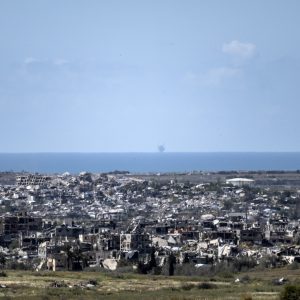Farming in West Bank ‘much better than working in Israel’
Bayt Dajan, Palestinian Territories — AFP
Hussein Jamil held a permit to work in Israel for 22 years until the war on Gaza began. Now, after setting up a greenhouse in a West Bank village, he swears he’ll never go back.
Harvesting his tomatoes in the occupied West Bank, the 46-year-old says his former Israeli boss has already called several times to ask him to return.
“But I told him that I would never go back to work there,” he says in Bayt Dajan near Nablus, the northern West Bank’s commercial centre.
There, dozens of men have returned to the traditional pursuit of tilling the land, rather than board buses to queue at the heavily guarded checkpoints that lead into Israel.
“It’s a very useful job and above all safer” than working in Israel, says Jamil, as he tends to his plants with his sons.
Israel stopped issuing work permits for Palestinians after October 7 as it launched an unprecedented blitzkrieg on the besieged territory which has so far left 39,790 dead, most of them children and women. A study done by The Lancet journal last month estimates the actual number of deaths due to the Israeli offensive to be more than 186,000 — which is more than 8% of the total population of the battered territory.
Jamil was one of 200,000 Palestinians from the West Bank who were working in Israel legally or illegally, according to the Palestinian General Confederation of Labour, and who lost their livelihoods overnight.
Salaries in Israel are more than double what Palestinians can make in the occupied territories, according to the World Bank.
Many of those workers are now busy in the greenhouses that have sprouted up in recent months on the hillsides where, Palestinian elders say, their ancestors once grew wheat.
Working this way, “we are independent and peaceful,” says Jamil, adding: “It’s much better than working in Israel. Here we work on our land.”
– West Bank violence –
Economic prospects have dived since Israeli restrictions in the wake of the war on Gaza, with unemployment leaping from 12.9 percent to 32 percent in the final three months of 2023.
Some 144,000 jobs have been lost in the occupied territory, many because of rising violence by illegal Israeli settlers who have been emboldened by the ongoing bloodbath in Gaza. The Israeli army continues to block roads, strangling economic activity.
Since October 7, at least 617 Palestinians have been killed in the West Bank by the Israeli army or illegal settlers, according to a count based on official Palestinian data.
Every day, around $22 million in income is lost in the West Bank due to high handed Israeli policies, according to International Labor Organization (ILO).
In Bayt Dajan alone, 300-350 men worked in Israel out of a population of 5,000.
Mazen Abu Jaish, 43, who spent 10 years working in Israel, took his time before deciding to pick up his shovel and rake and set up a tomato greenhouse.
“We waited, thinking that we would get our jobs back again after the war,” he said.
But unlike previous wars in Gaza, which never lasted more than a few weeks, the current war is fast approaching its first anniversary.
“So we ended up getting together with 35 other people from the village and we decided to start farming rather than keep waiting,” says Jaish.
Since October 7, 15 hectares of Bayt Dajan have been covered by greenhouses with tomatoes and cucumbers, grown by people who used to work in Israel, municipal officials say.










